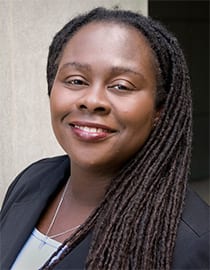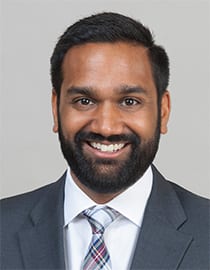By Andrew Cohen
Angela Onwuachi-Willig and Tejas Narechania knew full well about the Top 10 national ranking, renowned faculty and exceptional students. But Berkeley Law’s collegial culture provided another major selling point for its newest full-time professors.
“What really drew me in was the amazing community,” said Onwuachi-Willig, who also joins the Haas Institute for a Fair and Inclusive Society faculty. “(Interim Dean) Melissa Murray held a reception for me at her house, and all the faculty who came were so warm and welcoming to me and my family. My husband especially was touched by how friendly and encouraging everyone was.”
Narechania, a former UC Berkeley undergrad, appreciates seeing that the environment he remembered from college extends to the law school. “It’s a collaborative culture rather than a competitive one,” he said. “I think the school’s public mission helps drive that.”
Authenticity advocate

When she began teaching in 2003 at UC Davis School of Law, Onwuachi-Willig “tried to be who others advised me to be—tough and gruff. That just wasn’t me. I learned that the most important part of being an effective educator is to be your authentic self.”
Over the past 10 years at the University of Iowa’s College of Law, multiple teaching awards have cemented that belief. “I care about my students, not only as students but as people,” she said. “These days, I’m not afraid to let that show.”
This spring, Onwuachi-Willig will teach Family Law and The Critical Race Theory of Black Lives Matter, a one-credit course for 1Ls. Going forward, she will teach a range of courses, including Employment Discrimination, Evidence and Torts. She also looks forward to working with faculty and students in Berkeley Law’s Jurisprudence and Social Policy Program and the University’s Department of African American Studies.
“I want students to leave my class at least rethinking or reconsidering the worldview with which they entered the course,” Onwuachi-Willig said. “I want them to not only understand how to read and interpret legal doctrine, but how to apply the law with a true sense of how law shapes society and vice versa.”
Her scholarship generally centers on race, law and inequality, with an eye toward anti-discrimination law or family law. Her current research focuses on the intersection of law, cultural sociology and history. She is currently working on several articles and a book project about cultural trauma and the killings of Emmett Till and Trayvon Martin, a book of essays tentatively titled Mothering After Trayvon and a co-edited book project entitled Critical Race Judgments.
Continuing that work alongside her new colleagues was another huge selling point in coming to Berkeley. “For years, I have known and worked with a number of faculty at Berkeley. But, I still vividly recall looking through the law school website and thinking, ‘Wow, what a star-studded group!’” she said. “To my mind, the scholars here are engaged in some of the most thought-provoking, complex and intellectually stimulating research around.”
A University of Michigan Law School graduate, Onwuachi-Willig completed two judicial clerkships and worked as a labor and employment lawyer at Jones Day in Cleveland and Foley Hoag in Boston. Upon entering academia, her reputation as a leading scholar emerged quickly.
In 2006, she received the Association of American Law Schools’ Derrick A. Bell Award, given to a junior faculty member who has made an extraordinary contribution to legal education, the legal system or social justice. Last year, she won the organization’s Clyde S. Ferguson Award—joining co-author Mario Barnes ’95 as the first to receive both honors. She has since held several AALS leadership positions.
In 2010, Onwuachi-Willig was chosen as a finalist for the Iowa Supreme Court. The following year, the National Law Journal named her one of America’s top young legal professionals and placed her on its “Minority 40 under 40” list.
Also in 2011, she spent a week as a scholar-in-residence at Berkeley Law’s Thelton E. Henderson Center for Social Justice. “I left with wonderful thoughts about the law school,” she said. “The students were fantastic—very impressive. I couldn’t have asked for a more positive experience.”
More positive experiences: Onwuachi-Willig attended a “spectacular” Law Students of African Descent celebration during Admitted Students Weekend in March, and received an envelope of “heartwarming” letters from students in the Women of Color Collective. “Their letters really touched me because I remember being in their shoes,” she said. “I know how important it is to have women of color on the faculty as role models, mentors and community members who bring an underrepresented perspective to the school.”
Supremely grateful

Narechania returns to Berkeley after a coveted clerkship with U.S. Supreme Court Justice Stephen Breyer. “It gave me a lifetime of memories and taught me so much, especially on how to approach difficult and uncertain questions of law,” he said. “Walking into the Supreme Court every day was a weighty responsibility and a genuine thrill.”
Narechania will co-teach the Law and Technology Writing Workshop with Professor Molly Van Houweling this fall, and a first-year Property section in the spring. He will also become a faculty co-director of the Berkeley Center for Law & Technology (BCLT).
“Joining BCLT was a huge draw,” he said. “The center has been a longtime leader on tech-law issues and is well known for exceptional faculty, great resources and a commitment to pursuing pioneering work. That’s one of many reasons why I’m so eager to get started.”
Narechania’s meteoric rise in just five years since graduating from law school included a stint as special counsel at the Federal Communications Commission (FCC), where he oversaw all matters relating to network neutrality rules.
He has already produced substantial published work on innovation policy, tackling topics such as patent conflicts, judicial priorities and government authority over broadband regulation. The FCC cited one such paper in its most recent notice of proposed rulemaking on net neutrality, which he called “exhilarating and gratifying.”
Entering college, a law career was nowhere to be found on Narechania’s career GPS. Majoring in Electrical Engineering and Computer Science, he “planned to become a computer programmer for the rest of my life.” But a class on legal and social issues related to technological change prompted him to also major in Political Science—and to think more broadly about the intersections of law and technology.
After graduating, Narechania spent three years at Microsoft developing marketing strategies for beta-version software and building training programs for high-value clients. Seeing the extent to which antitrust and other legal issues affected the company’s operations paved a path toward Columbia Law School.
There, he won academic awards for outstanding academic achievement, best original essay on a legal subject, distinguished legal writing, highest annual academic honor and outstanding faculty research assistance. After clerking for Chief Judge Diane Wood on the U.S. Court of Appeals for the Seventh Circuit, Narechania returned to Columbia in 2013 as a research fellow in law, science and technology.
“I’m truly honored to be back in Berkeley as part of the law school faculty,” he said. “The school is so well regarded, especially in my areas of research—law and technology, intellectual property, antitrust … I’m so excited to learn from so many top scholars, some of whom essentially created their fields.”